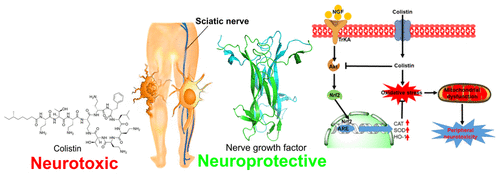当前位置:
X-MOL 学术
›
ACS Infect. Dis.
›
论文详情
Our official English website, www.x-mol.net, welcomes your feedback! (Note: you will need to create a separate account there.)
Nerve Growth Factor Confers Neuroprotection against Colistin-Induced Peripheral Neurotoxicity.
ACS Infectious Diseases ( IF 5.3 ) Pub Date : 2020-05-18 , DOI: 10.1021/acsinfecdis.0c00107 Chongshan Dai 1 , Jianli Xiong 2 , Yang Wang 1 , Jianzhong Shen 1 , Tony Velkov 3 , Xilong Xiao 1
ACS Infectious Diseases ( IF 5.3 ) Pub Date : 2020-05-18 , DOI: 10.1021/acsinfecdis.0c00107 Chongshan Dai 1 , Jianli Xiong 2 , Yang Wang 1 , Jianzhong Shen 1 , Tony Velkov 3 , Xilong Xiao 1
Affiliation

|
Neurotoxicity is an unwanted side effect for patients when receiving parenteral colistin therapy. The development of effective neuroprotective agents that can be coadministered during colistin therapy remains a priority area in antimicrobial chemotherapy. The present study aimed to investigate the protective effect of nerve growth factor (NGF) against colistin-induced peripheral neurotoxicity using a murine model. C57BL/6 mice were randomly divided into the following 6 groups: (i) untreated control, (ii) NGF alone (36 μg/kg/day administered intraperitoneally), (iii) colistin alone (18 mg/kg/day administered intraperitoneally), and (iv–vi) colistin (18 mg/kg/day) plus NGF (9, 18, and 36 μg/kg/day). After treatment for 7 days, neurobehavioral and electrophysiology changes, histopathological assessments of sciatic nerve damage, and oxidative stress biomarkers were examined. The mRNA expression levels of Nrf2, HO-1, Akt, Bax, and caspase-3 and -9 were assessed using quantitative RT-PCR. The results showed that, across all the groups wherein NGF was coadministered with colistin, a marked attenuation of colistin-induced sciatic nerve damage and improved sensory and motor function were observed. In comparison to the colistin only treatment group, animals that received NGF displayed upregulated Nrf2 and HO-1 mRNA expression levels and downregulated Bax and caspase-3 and -9 mRNA expression levels. In summary, our study reveals that NGF coadministration protects against colistin-induced peripheral neurotoxicity via the activation of Akt and Nrf2/HO-1 pathways and inhibition of oxidative stress. This study highlights the potential clinical application of NGF as a neuroprotective agent for coadministration during colistin therapy.
中文翻译:

神经生长因子赋予针对colistin诱导的周围神经毒性的神经保护作用。
当接受肠胃大肠菌素治疗时,神经毒性对于患者来说是有害的副作用。可在粘菌素治疗期间共同给药的有效神经保护剂的开发仍然是抗菌化学疗法的优先领域。本研究旨在利用鼠模型研究神经生长因子(NGF)对粘菌素诱导的周围神经毒性的保护作用。C57BL / 6小鼠随机分为以下6组:(i)未经治疗的对照组,(ii)仅NGF(腹膜内给药36μg/ kg /天,)(iii)大肠粘菌素(腹膜内给药18 mg / kg /天)和(iv-vi)大肠菌素(18 mg / kg /天)加上NGF(9、18和36μg/ kg /天)。治疗7天后,神经行为和电生理改变,坐骨神经损伤的组织病理学评估,并检测氧化应激生物标志物。使用定量RT-PCR评估Nrf2,HO-1,Akt,Bax和caspase-3和-9的mRNA表达水平。结果表明,在将NGF与粘菌素合用的所有组中,观察到粘菌素诱导的坐骨神经损伤明显减轻,感觉和运动功能得到改善。与仅粘菌素的治疗组相比,接受NGF的动物显示出Nrf2和HO-1 mRNA表达水平上调,而Bax和caspase-3和-9 mRNA表达水平下调。总而言之,我们的研究揭示了NGF共同给药可通过Akt和Nrf2 / HO-1途径的激活以及氧化应激的抑制来保护大肠菌素诱导的周围神经毒性。
更新日期:2020-05-18
中文翻译:

神经生长因子赋予针对colistin诱导的周围神经毒性的神经保护作用。
当接受肠胃大肠菌素治疗时,神经毒性对于患者来说是有害的副作用。可在粘菌素治疗期间共同给药的有效神经保护剂的开发仍然是抗菌化学疗法的优先领域。本研究旨在利用鼠模型研究神经生长因子(NGF)对粘菌素诱导的周围神经毒性的保护作用。C57BL / 6小鼠随机分为以下6组:(i)未经治疗的对照组,(ii)仅NGF(腹膜内给药36μg/ kg /天,)(iii)大肠粘菌素(腹膜内给药18 mg / kg /天)和(iv-vi)大肠菌素(18 mg / kg /天)加上NGF(9、18和36μg/ kg /天)。治疗7天后,神经行为和电生理改变,坐骨神经损伤的组织病理学评估,并检测氧化应激生物标志物。使用定量RT-PCR评估Nrf2,HO-1,Akt,Bax和caspase-3和-9的mRNA表达水平。结果表明,在将NGF与粘菌素合用的所有组中,观察到粘菌素诱导的坐骨神经损伤明显减轻,感觉和运动功能得到改善。与仅粘菌素的治疗组相比,接受NGF的动物显示出Nrf2和HO-1 mRNA表达水平上调,而Bax和caspase-3和-9 mRNA表达水平下调。总而言之,我们的研究揭示了NGF共同给药可通过Akt和Nrf2 / HO-1途径的激活以及氧化应激的抑制来保护大肠菌素诱导的周围神经毒性。


























 京公网安备 11010802027423号
京公网安备 11010802027423号